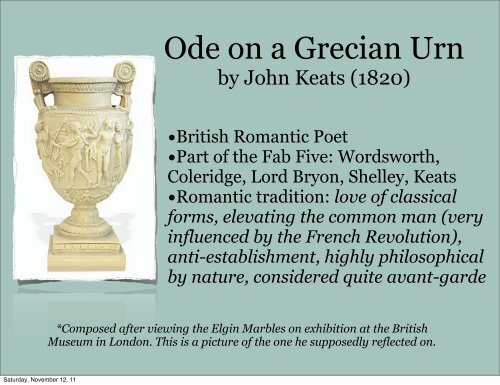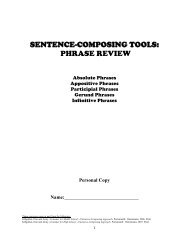Ode on a Grecian Urn
Ode on a Grecian Urn
Ode on a Grecian Urn
You also want an ePaper? Increase the reach of your titles
YUMPU automatically turns print PDFs into web optimized ePapers that Google loves.
Saturday, November 12, 11<br />
<str<strong>on</strong>g>Ode</str<strong>on</strong>g> <strong>on</strong> a <strong>Grecian</strong> <strong>Urn</strong><br />
by John Keats (1820)<br />
•British Romantic Poet<br />
•Part of the Fab Five: Wordsworth,<br />
Coleridge, Lord Bry<strong>on</strong>, Shelley, Keats<br />
•Romantic traditi<strong>on</strong>: love of classical<br />
forms, elevating the comm<strong>on</strong> man (very<br />
influenced by the French Revoluti<strong>on</strong>),<br />
anti-establishment, highly philosophical<br />
by nature, c<strong>on</strong>sidered quite avant-garde<br />
*Composed after viewing the Elgin Marbles <strong>on</strong> exhibiti<strong>on</strong> at the British<br />
Museum in L<strong>on</strong>d<strong>on</strong>. This is a picture of the <strong>on</strong>e he supposedly reflected <strong>on</strong>.
A variety of paradoxes that compare the urn’s art form<br />
and the poet’s own art. The speaker is just an observer--<br />
periodically speaks to the urn and also to the reader.<br />
• works of art and real life<br />
• truth and beauty<br />
• frozen images and dynamic emoti<strong>on</strong>s<br />
• mortality and imoortality<br />
• the transient/human and the eternal/unchageable<br />
• ancient/classical Greece and comtemporary society<br />
• the art of poetry and the art of st<strong>on</strong>ework and<br />
painting, etc.<br />
Saturday, November 12, 11
Stanza 1<br />
to the urn<br />
Does “still” modify “unravished” or<br />
“bride”? How would it change the meaning?<br />
1. still/quiet/unmoving/frozen 2. virgin/in tact/pure/untouched<br />
the urn<br />
Thou still unravished bride of quietness,<br />
Thou foster child of silence and slow time,<br />
4. Foster child/adopted/created for<br />
Sylvan historian, who canst thus express<br />
A flowery tale more sweetly than our rhyme:<br />
What leaf-fringed legend haunts about thy shape<br />
{<br />
Of deities or mortals, or of both,<br />
In Tempe or the dales of Arcady?<br />
What men or gods are these? What maidens loath?<br />
Rhyme scheme: ababcdedce<br />
Meter: Iambic pentameter<br />
Saturday, November 12, 11<br />
What mad pursuit? What struggle to escape?<br />
What pipes and timbrels? What wild ecstasy?<br />
{<br />
Caesuras?<br />
Enjambment? Note<br />
the hard stop with<br />
col<strong>on</strong>s and questi<strong>on</strong><br />
marks.<br />
3. married to quietness? Why<br />
quiet? Silent? Unemoti<strong>on</strong>al?<br />
Frozen in time?<br />
5. Not a questi<strong>on</strong>: a<br />
statement.<br />
What c<strong>on</strong>s<strong>on</strong>ant<br />
sounds are repeated<br />
both alliteratively and<br />
as c<strong>on</strong>s<strong>on</strong>ance?<br />
5. Why are they loath?<br />
What is the purpose of<br />
the questi<strong>on</strong>s?<br />
{<br />
What c<strong>on</strong>s<strong>on</strong>ant<br />
sounds are repeated<br />
both aliteratively and<br />
as c<strong>on</strong>s<strong>on</strong>ance?
Stanza 2<br />
Who has the<br />
sensual ear?<br />
A young<br />
man <strong>on</strong><br />
the urn<br />
Heard melodies are sweet, but those unheard<br />
Rhyme scheme: ababcdeced<br />
Meter: Iambic pentameter<br />
Saturday, November 12, 11<br />
What are the “heard melodies”? The sweeter<br />
“unheard” melodies? Why are they sweeter?<br />
Are sweeter; therefore, ye soft pipes, play <strong>on</strong>;<br />
Not to the sensual ear, but, more endeared,<br />
Pipe to the spirit ditties of no t<strong>on</strong>e.<br />
Fair youth, beneath the trees, thou canst not leave<br />
Thy s<strong>on</strong>g, nor ever can those trees be bare;<br />
Bold Lover, never, never canst thou kiss,<br />
Though winning near the goal—-yet, do not grieve;<br />
She cannot fade, though thou hast not thy bliss<br />
Forever wilt thou love, and she be fair!<br />
{<br />
Pipe to the spirit/soul/art lover--little<br />
silent s<strong>on</strong>gs<br />
trees <strong>on</strong> the urn will always be<br />
leafy...always spring<br />
trees <strong>on</strong> the urn will always b<br />
leafy...always spring<br />
The young man will always be leaning in l<strong>on</strong>ging for a kiss, but<br />
will never attain “bliss.” He will never have her--never<br />
c<strong>on</strong>sumate their love, YET she will never grow old and<br />
unnattractive and your love will always be the young love-undefiled<br />
by life and hardship. Is the speaker envious or is he<br />
being sarcastic? Can you make a case for both?
Stanza 3 Ok, this is where the t<strong>on</strong>e seems to either be<br />
mocking...or tragically envious...Make a case for<br />
either.<br />
How does the<br />
repetiti<strong>on</strong><br />
used in this<br />
stanza affect<br />
your reading<br />
of it?<br />
Ah, happy, happy boughs! that cannot shed<br />
Your leaves, nor ever bid the Spring adieu;<br />
And, happy melodist, unweari-ed,<br />
Forever piping s<strong>on</strong>gs forever new;<br />
More happy love! more happy, happy love!<br />
Forever warm and still to be enjoyed,<br />
Forever panting, and forever young;<br />
All breathing human passi<strong>on</strong> far above,<br />
Rhyme scheme: ababcdecde<br />
Meter: Iambic pentameter<br />
Saturday, November 12, 11<br />
That leaves a heart high-sorrowful and cloyed,<br />
A burning forehead, and a parching t<strong>on</strong>gue.<br />
{<br />
*c<strong>on</strong>tinued use of<br />
caesuras and line<br />
enjambment.<br />
*C<strong>on</strong>s<strong>on</strong>ance: “t” “p” “d”<br />
this is different how? and<br />
why? To what effect?<br />
Seriously! This guy has had<br />
some bad love experiences.<br />
above/elevated/higher/<br />
more valuable/spiritual<br />
{<br />
Heat--passi<strong>on</strong>--leaves humans<br />
burning and thirsty for more, but<br />
never satisfied. Could he be envying<br />
the lovers <strong>on</strong> the urn?
Stanza 4<br />
Cow is lucky-never<br />
will be<br />
sacrificed--just<br />
always<br />
anticipating the<br />
sacrifice...<br />
A switch in characters...religious/pagan rituals<br />
Who are these coming to the sacrifice?<br />
To what green altar, O mysterious priest,<br />
Lead'st thou that heifer lowing at the skies,<br />
And all her silken flanks with garlands dressed?<br />
What little town by river or sea shore,<br />
Or mountain-built with peaceful citadel,<br />
Is emptied of this folk, this pious morn?<br />
And, little town, thy streets for evermore<br />
Rhyme scheme: ababcdecde<br />
Meter: Iambic pentameter<br />
Saturday, November 12, 11<br />
Will silent be; and not a soul to tell<br />
Why thou art desolate, can e'er return.<br />
{<br />
*c<strong>on</strong>tinued use of caesuras<br />
and line enjambment.<br />
*C<strong>on</strong>s<strong>on</strong>ance: “S” much<br />
softer sound. Some “T” as<br />
well. To what effect?<br />
Ass<strong>on</strong>ance: “or” sound<br />
Town will<br />
always be<br />
emptied--no<br />
<strong>on</strong>e there<br />
ever--all at the<br />
pagan ritual.<br />
Is there a shift of t<strong>on</strong>e yet?
Stanza 5<br />
antique<br />
And back to talking to the urn!<br />
O Attic shape! Fair attitude! with brede<br />
Of marble men and maidens overwrought,<br />
With forest branches and the trodden weed;<br />
notice the commas offsetting “silent form”<br />
Thou, silent form, dost tease us out of thought<br />
As doth eternity. Cold Pastoral!<br />
When old age shall this generati<strong>on</strong> waste,<br />
Thou shalt remain, in midst of other woe<br />
Than ours, a friend to man, to whom thou say'st,<br />
"Beauty is truth, truth beauty"---that is all<br />
Ye know <strong>on</strong> earth, and all ye need to know.<br />
Rhyme scheme: ababcdedce<br />
Meter: Iambic pentameter<br />
Saturday, November 12, 11<br />
braid<br />
{<br />
*c<strong>on</strong>tinued use of caesuras<br />
and line enjambment.<br />
*C<strong>on</strong>s<strong>on</strong>ance: “T” and “d”<br />
To what effect? Ass<strong>on</strong>ance:<br />
Distract us and toy with us<br />
like thoughts of death?<br />
Unfeeling, frozen pastoral<br />
scene of bliss...<br />
{ Who is”ye”? This is <strong>on</strong>e of the most debated lines<br />
in poetry...is the speaker being sarcastic? Is the<br />
statement true for the urn? For man?






